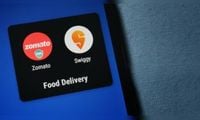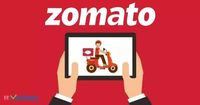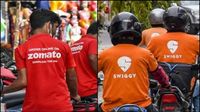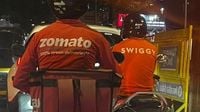Zomato shares took a noticeable 5% plunge on March 26, 2025, following a downgrade from Bank of America (BofA) Securities, adjusting their rating from "buy" to "neutral" and lowering the stock's price target from Rs 300 to Rs 250. The bearish sentiment was primarily influenced by concerns about rising losses in quick commerce and decelerating growth in food delivery, which BofA highlighted in a recent note. They project Zomato’s EBITDA for the financial years 2026 and 2027 to be 20% to 50% below street expectations.
This downgrade echoes similar changes for competitor Swiggy, which also encountered a double downgrade from "buy" to "underperform," along with a significant reduction in its target price from Rs 420 to Rs 325. This brought Swiggy's stock to tread perilously close to its IPO price of Rs 390, as shares fell 3.2% to hit an intraday low of Rs 326.60 on the Bombay Stock Exchange (BSE).
As financial analysts scrutinize the performance of these food delivery giants, the outlook for both companies appears mixed. While quick commerce has thus far not shown substantial slowdowns, reports suggest that cash flow concerns are beginning to surface. BofA predicts that prolonged competition in the quick commerce sector will exert further strain, with increases in operational costs and challenges in achieving profitability.
During a past earnings report, Zomato’s Chief Financial Officer, Akshant Goyal, indicated a tough road ahead for Blinkit, Zomato's quick commerce initiative. “Blinkit will likely remain loss-making in FY25 and FY26 due to ongoing investments,” he had asserted. On the other hand, Zomato CEO Deepinder Goyal explained that the current losses were largely attributed to aggressive investments aimed at accelerating growth. “It seems we will get to our target of 2,000 stores by December 2025, much sooner than our previous guidance of December 2026,” he asserted.
This week, Jefferies also chimed in with its predictions, estimating 2025 to be a year of consolidation for Zomato shares after they doubled in value during 2024. Jefferies warned that aggressive strategies from existing players alongside new entrants could trigger intense competition, resulting in heightened discounting and customer acquisition costs, which could further threaten future profitability.
Out of the approximately 30 analysts tracking Zomato, a significant majority, 24, retained a "buy" recommendation, while 4 suggested a sell. Similarly, Swiggy has 11 analysts backing the stock as a buy while 4 recommend striking it off. BofA's revisions highlight serious concerns surrounding both firms' ability to maintain growth momentum in an escalating competition landscape.
Although the food delivery sector continues to grow, the sluggish cash flows and increasing operational expenses delineate a complicated path ahead for Zomato and Swiggy, particularly as they invest in quick commerce. Analysts have been vocal about the importance of adjusting growth strategies in light of intensified price wars initiated by new market entrants and rival expansions.
The investment climate surrounding food delivery rallies around the dichotomy between scaling operations and managing profitability. Investors worry that if these companies don’t refine their strategies promptly, the market can expect even tougher quarters ahead. As the stock market reacts, both Zomato and Swiggy face scrutiny working towards achieving a workable balance in their operations.
In wrapping up, the pressures of high competition and evolving market dynamics underline the necessity for Zomato and Swiggy to devise actionable strategies to enhance profitability while navigating the sometimes treacherous waters of rapid expansion. Moving forward, these companies must adapt quickly to sustain investor confidence and avert more significant downturns in their stock valuations.








